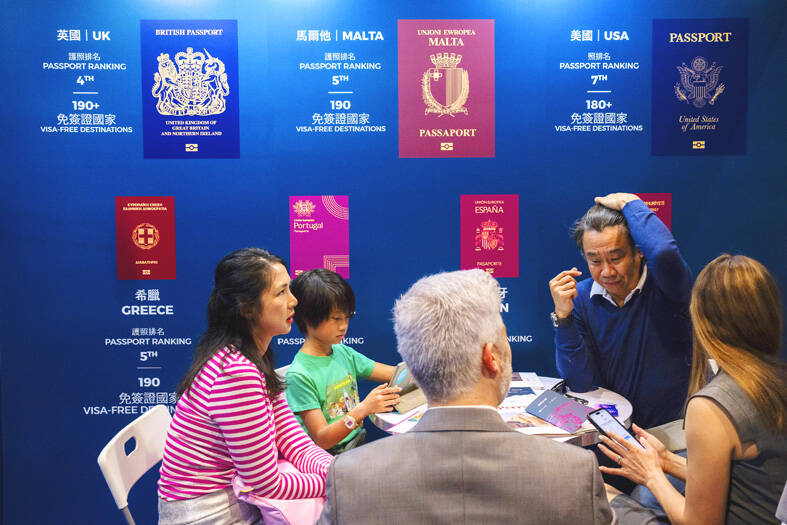Hong Kong’s new national security law yesterday came into force, despite growing international criticism that it could erode freedoms in the China-ruled territory and damage its international financial hub credentials, as Taiwan and other countries updated their travel advisories for Hong Kong.
The law, also known as Article 23, took effect at midnight, days after the territory’s pro-Beijing lawmakers passed it unanimously, fast-tracking legislation to plug what authorities called national security loopholes.
Hong Kong Chief Executive John Lee (李家超) said the law “accomplished a historic mission, living up to the trust placed in us by the Central [Chinese] Authorities.”

Photo: AP
The US expressed concerns that the law would further erode the territory’s autonomy and damage its reputation as an international business hub.
“It includes vaguely defined provisions regarding ‘sedition,’ ‘state secrets’ and interactions with foreign entities that could be used to curb dissent,” US Secretary of State Antony Blinken said in a statement.
Australia and the UK on Friday criticized the law after a bilateral meeting in Adelaide, expressing “deep concerns about the continuing systemic erosion of autonomy, freedoms and rights” in Hong Kong.
The UN and the EU recently noted the extremely swift passage of the law with limited public consultation, by a legislature overhauled in the past few years to remove opposition democrats.
Taiwan, Australia and the UK updated their travel advisories for Hong Kong, urging citizens to exercise caution.
“You could break the laws without intending to and be detained without charge and denied access to a lawyer,” the Australian government said.
Hong Kong authorities “strongly condemned such political maneuvers with skewed, fact-twisting, scaremongering and panic-spreading remarks.”
In a joint statement led by the overseas-based Hong Kong Democracy Council, 145 community and advocacy groups condemned the law and called for sanctions on Hong Kong and Chinese officials involved its passage, as well as a review of the status of Hong Kong Economic and Trade Offices worldwide.
“It’s time for the United States to step up for political prisoners and freedom in Hong Kong. Every time we let authoritarians get away with atrocities, we risk other bad actors attempting to do the same,” wanted Hong Kong activist Frances Hui (許穎婷) told a news conference in Washington with the US Congressional-Executive Commission on China (CECC), which advises the US Congress.
Chris Smith, a cochairman of the CECC, said the Hong Kong trade offices had “simply become outposts of the Chinese Communist Party, used to engage in transnational repression.”

NATIONAL SECURITY THREAT: An official said that Guan Guan’s comments had gone beyond the threshold of free speech, as she advocated for the destruction of the ROC China-born media influencer Guan Guan’s (關關) residency permit has been revoked for repeatedly posting pro-China content that threatens national security, the National Immigration Agency said yesterday. Guan Guan has said many controversial things in her videos posted to Douyin (抖音), including “the red flag will soon be painted all over Taiwan” and “Taiwan is an inseparable part of China,” while expressing hope for expedited “reunification.” The agency received multiple reports alleging that Guan Guan had advocated for armed reunification last year. After investigating, the agency last month issued a notice requiring her to appear and account for her actions. Guan Guan appeared as required,

A strong cold air mass is expected to arrive tonight, bringing a change in weather and a drop in temperature, the Central Weather Administration (CWA) said. The coldest time would be early on Thursday morning, with temperatures in some areas dipping as low as 8°C, it said. Daytime highs yesterday were 22°C to 24°C in northern and eastern Taiwan, and about 25°C to 28°C in the central and southern regions, it said. However, nighttime lows would dip to about 15°C to 16°C in central and northern Taiwan as well as the northeast, and 17°C to 19°C elsewhere, it said. Tropical Storm Nokaen, currently

PAPERS, PLEASE: The gang exploited the high value of the passports, selling them at inflated prices to Chinese buyers, who would treat them as ‘invisibility cloaks’ The Yilan District Court has handed four members of a syndicate prison terms ranging from one year and two months to two years and two months for their involvement in a scheme to purchase Taiwanese passports and resell them abroad at a massive markup. A Chinese human smuggling syndicate purchased Taiwanese passports through local criminal networks, exploiting the passports’ visa-free travel privileges to turn a profit of more than 20 times the original price, the court said. Such criminal organizations enable people to impersonate Taiwanese when entering and exiting Taiwan and other countries, undermining social order and the credibility of the nation’s

‘SALAMI-SLICING’: Beijing’s ‘gray zone’ tactics around the Pratas Islands have been slowly intensifying, with the PLA testing Taiwan’s responses and limits, an expert said The Ministry of National Defense yesterday condemned an intrusion by a Chinese drone into the airspace of the Pratas Islands (Dongsha Islands, 東沙群島) as a serious disruption of regional peace. The ministry said it detected the Chinese surveillance and reconnaissance drone entering the southwestern parts of Taiwan’s air defense identification zone early yesterday, and it approached the Pratas Islands at 5:41am. The ministry said it immediately notified the garrison stationed in the area to enhance aerial surveillance and alert levels, and the drone was detected in the islands’ territorial airspace at 5:44am, maintaining an altitude outside the effective range of air-defense weaponry. Following